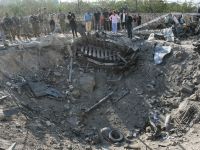Afghanistan's Taliban regime Sunday called on neighboring Pakistan to lift a ban it has imposed on the entry of new Afghan refugees fleeing war and drought in their homeland.
The ruling militia's Minister of Information Qadratullah Jamal said the ban would affect Afghans who wanted to join their family members living in large numbers in Pakistan.
"We want the government of Pakistan to treat the refugees the way it did before," Jamal said, adding that some Afghan families had half of their members living across the borders.
The Pakistani authorities argued there was no room for the new arrivals escaping the fighting in the northeast and a fierce drought over much of the country, the minister said.
Most of the refugees, living in Pakistan since the 1978-1988 Soviet invasion, return home during the summer and return to Pakistan when the Afghan harsh winter sets in, Jamal added
"Afghans come here to re-build their houses. If the houses are not completed then they go back," Jamal said.
He denied reports that more Afghans were heading to Pakistan from the northeastern areas due to the Taliban's "ill-treatment".
Jamal accused the media of ignoring the refugees when they returned home and only focusing on them when they left.
Islamabad imposed the new ban on Thursday, directing strict checks at all border crossing points.
Pakistani officials cited economic reasons for the ban.
Interior Minister Moinuddin Haider Saturday said the international community should share Pakistan's burden in looking after the refugees.
Haider said the UNHCR (UN High Commissioner for Refugees) had admitted Pakistan had the highest number of refugees in the world and that it should receive more assistance.
Syed Iftikhar Hussain Shah, governor of Pakistan's North West Frontier Province (NWFP), said the move was taken after thorough deliberations.
Shah said the refugees should be settled and looked after by the UNHCR on the Afghan side of the border.
Pakistan shelters around 1.5 million registered refugees, most from the 1979-89 anti-Soviet war in Afghanistan. The total number is estimated to be around three million.
Some parts of the border Pakistani city of Peshawar, in particular the posh area of Hayatabad, have almost become an Afghan colony, with shops and schools for the refugees.
Officials in Peshawar said the ban would not affect the arrival of relatives of Afghan refugees already living in Pakistan or legal cross-border trade.
The inflow of fruit, marble and scrap from Afghanistan to Pakistan would also continue, they said -- KABUL (AFP)
© 2000 Al Bawaba (www.albawaba.com)







